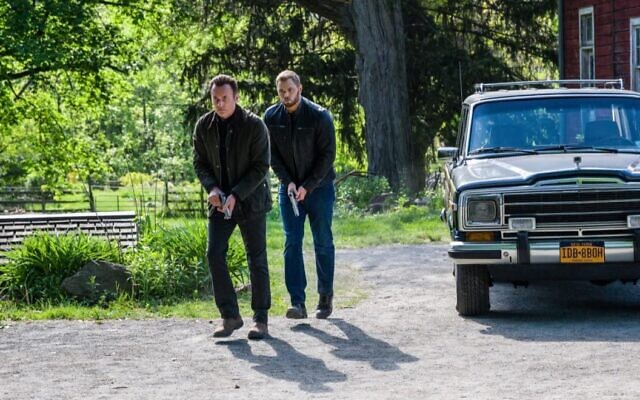Southern Jews on ‘FBI: Most Wanted’
Rabbi Elliot Gertel on the Southern Jewish victims and villains of CBS’s ‘FBI: Most Wanted’ season finale, ‘Chattaboogie.’
The season finale of CBS’s “FBI: Most Wanted” offered a take on Southern Jewish history.
The episode caught my attention with an opening scene that might be a television first: the recitation of the traditional blessing (boray peri ha-etz) over fruit. But very shortly afterward, the young woman who has recited the blessing is shot to death. So much for the longevity in this series of Jews who eat in the traditional manner.
The deceased woman, Elise (Lauriel Friedman), was the sister of Jason Shalet, a confidential informant who had worked at a local car dealership in Jasper, Tennessee. Jason is also shot to death.
It turns out that Elise and Jason had been sitting shiva in Jasper for their 63-year-old father, Gerald, who had died of a heart attack. Gerald had owned a carpet mill in Dalton, Ga. An FBI agent can tell that they were sitting shiva because “the mirrors were covered” and there was “some memorial candle on a table next to a photo.”

In initiating the investigation, an FBI official observes, “This used to be moonshine country, and these people have gone from stills to pills. They’re clannish and violent and they’ll lie to your face and smile while doing it. Also, the only thing they hate more than government is outsiders.” I braced myself for another major, gratuitous media attack on so-called “red neck” rural Southerners, but the scope of censure was far wider and more surprising than I had anticipated.
Yes, a family with a small poultry farm figured in a lot of drug running, but so did old well-established Jewish families, including the Shalets and the Kleinmans, who own a major grocery chain. The bond between the Christian families and early Jewish immigrants is expressed here in the declaration, “Your daddy and my grandpa ran shine together.” Then they all moved on to (suspected) money laundering for the Mexican cartel and shipping addictive, toxic drugs.
The murder of two truck drivers for the Kleinman chain alerts FBI agents to Susan Kleinman (effectively played by Tracy McMullan), this generation’s store CEO. The cold-blooded Susan boasts that her business boomed during the pandemic and that the company had to increase its “fleet size.” She boasts, “My great-grandfather founded this company over 100 years ago. Most of the banks in town got their start because of him. I can walk into any one of them and get a line of credit just by saying ‘hello.’” A mezuzah is featured on the door while she lectures her FBI visitors.
An FBI agent asks her if she is Jewish in order to find out whether she knew the Shalets and about the shiva. She responds snarkily, “Is that a crime now, too?” Then she demands a warrant and makes threats about her high-powered lawyers.
Susan is arrogant, cool, even cold-blooded, ruthlessly calm, with a swift impulse for self-preservation. At one point she tells her would-be executioner: “I think you can use a breath mint.” She even lectures him: “It’s called diversification. If you knew how to run a business, you’d understand that.”

Yes, this episode offers a strong portrait of a Jewish woman who is always in control and who coolly avoids being a murder victim. But a young Jewish woman with some knowledge and observance of Judaism is crushed like a bug at the hour’s beginning.
And yes, this episode acknowledged a longstanding Jewish presence in the American South. After all, it is titled “Chattaboogie,” after a provincial Tennessee contra dance, thus testifying to that historic presence and breaking with most films and TV programs, whether drama or comedy, which suggest that Jews are totally out of place in the South.
But was any correction of misconceptions about Southern Jewish history worth the impression of Jews (and of Jewish women) that lingers long after this episode — not to mention the suggestion that these Jews might have gotten away with facilitating mass addiction and death, were it not for their taking advantage of gentiles with whom they’ve had a long association? There is not even honor among thieves in the “American Jewish history” lesson here.
Rabbi Elliot B. Gertel is Rabbi Emeritus of Congregation Rodfei Zedek in Chicago and the longtime film/TV critic for the “National Jewish Post and Opinion.”




comments